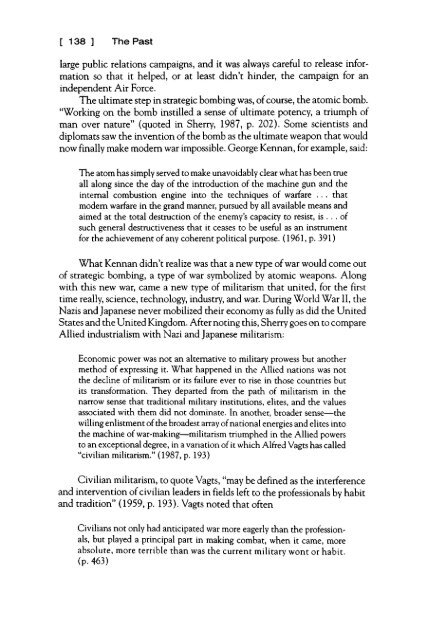entire book - Chris Hables Gray
entire book - Chris Hables Gray
entire book - Chris Hables Gray
Create successful ePaper yourself
Turn your PDF publications into a flip-book with our unique Google optimized e-Paper software.
[ 138 ] The Past<br />
large public relations campaigns, and it was always careful to release information<br />
so that it helped, or at least didn't hinder, the campaign for an<br />
independent Air Force.<br />
The ultimate step in strategic bombing was, of course, the atomic bomb.<br />
"Working on the bomb instilled a sense of ultimate potency, a triumph of<br />
man over nature" (quoted in Sherry, 1987, p. 202). Some scientists and<br />
diplomats saw the invention of the bomb as the ultimate weapon that would<br />
now finally make modern war impossible. George Kennan, for example, said:<br />
The atom has simply served to make unavoidably clear what has been true<br />
all along since the day of the introduction of the machine gun and the<br />
internal combustion engine into the techniques of warfare . . . that<br />
modern warfare in the grand manner, pursued by all available means and<br />
aimed at the total destruction of the enemy's capacity to resist, is ... of<br />
such general destructiveness that it ceases to be useful as an instrument<br />
for the achievement of any coherent political purpose. (1961, p. 391)<br />
What Kennan didn't realize was that a new type of war would come out<br />
of strategic bombing, a type of war symbolized by atomic weapons. Along<br />
with this new war, came a new type of militarism that united, for the first<br />
time really, science, technology, industry, and war. During World War II, the<br />
Nazis and Japanese never mobilized their economy as fully as did the United<br />
States and the United Kingdom. After noting this, Sherry goes on to compare<br />
Allied industrialism with Nazi and Japanese militarism:<br />
Economic power was not an alternative to military prowess but another<br />
method o{ expressing it. What happened in the Allied nations was not<br />
the decline of militarism or its failure ever to rise in those countries but<br />
its transformation. They departed from the path of militarism in the<br />
narrow sense that traditional military institutions, elites, and the values<br />
associated with them did not dominate. In another, broader sense—the<br />
willing enlistment of the broadest array of national energies and elites into<br />
the machine of war-making—militarism triumphed in the Allied powers<br />
to an exceptional degree, in a variation of it which Alfred Vagts has called<br />
"civilian militarism." (1987, p. 193)<br />
Civilian militarism, to quote Vagts, "may be defined as the interference<br />
and intervention of civilian leaders in fields left to the professionals by habit<br />
and tradition" (1959, p. 193). Vagts noted that often<br />
Civilians not only had anticipated war more eagerly than the professionals,<br />
but played a principal part in making combat, when it came, more<br />
absolute, more terrible than was the current military wont or habit,<br />
(p. 463)








